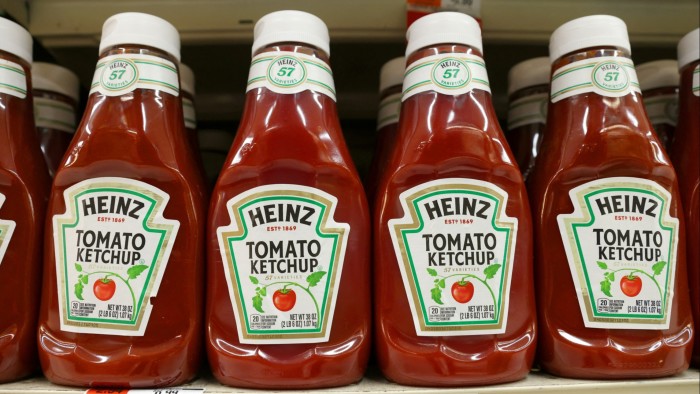Unlock the Editor’s Digest for free
Roula Khalaf, Editor of the FT, selects her favourite stories in this weekly newsletter.
Sometimes an investment looks so terrible even Warren Buffett can’t fix it. Kraft Heinz, the maker of sauces and convenience foods, is poised to break itself up after years of faltering sales and a falling share price. It’s a forlorn attempt to placate shareholders who could have done much better elsewhere. Buffett has metaphorical ketchup down his shirt, but his own investors have, relative to others in Kraft, come out on top.
Buffett’s investment company Berkshire Hathaway bought Heinz in 2013, in a co-investment with private equity firm 3G Capital. The two then made a bid for the listed Kraft Foods in 2015, emerging with half of the resulting mayo-to-macaroni-cheese maker. It didn’t go down well. After painful asset writedowns and profit warnings, 3G eventually sold its shares. Buffett stayed put, admitting he overpaid.
Zoom in on the numbers, though, and Buffett did better than one might expect. Berkshire Hathaway paid $4.3bn for its stake in Heinz. More cash added during the merger with Kraft took the total to $9.8bn. Today, its 27 per cent stake in Kraft Heinz is worth $8.8bn. But Buffett’s firm has also received about $6.3bn of dividends, Lex calculates. So in total, he is up nearly 60 per cent on his ordinary shares.
What’s more, the Oracle of Omaha made a tidy and faster profit by buying $8bn of Heinz preferred shares alongside his initial investment. These paid more than $2bn of dividends and were redeemed in full three years later.
Kraft’s shareholders, in contrast, get thin gruel. Back when the tie-up was announced in March 2015, Kraft Foods had a market capitalisation of $36bn. Those who stuck around received a $10bn payment when the merger was consummated, and about $13bn in regular dividends and buybacks since. Add in their half of Kraft Heinz, worth $16bn at market prices, and they’ve seen a meagre 8 per cent return over a decade.
Had an investor in Kraft instead bought shares in Unilever, the company Kraft Heinz tried unsuccessfully to buy in 2017, they would have nearly doubled their money, assuming they had taken dividends out in cash. Analysts expect Kraft Heinz’s revenue to shrink 3 per cent this year, as its Anglo-Dutch rival grows by 2 per cent.
Breaking up Kraft Heinz might help a bit. If nothing else, smaller chunks might attract bidders prepared to pay a premium. That happened at Kellogg’s, which split itself up two years ago. Mars is now buying its snacking arm Kellanova, while Italy’s Ferrero last week proposed acquiring cornflake-making division WK Kellogg.

Still, much time and money has been wasted — not least on bankers’ and consultants’ fees. There are two lessons from all of this. One is that merging two mediocre companies doesn’t produce one good one. The other is that it’s rarely a good idea to bet against Buffett. Thanks to an enduring tendency to get a better deal than others, even his worst slips can still work out pretty well.
